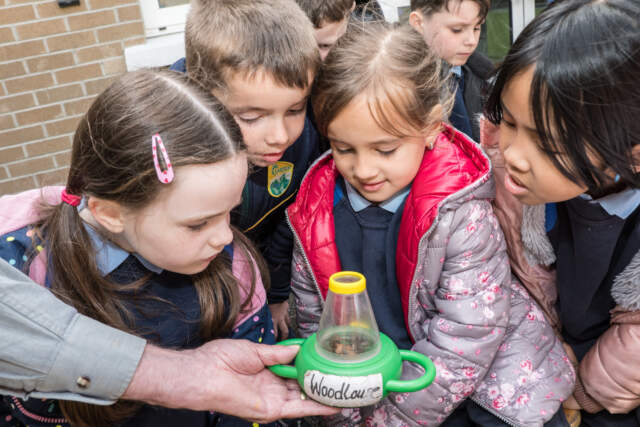Rang Teagaisc ar líne
Rang teagaisc an Comhairle Oidhreachta do daltaí bunscoile
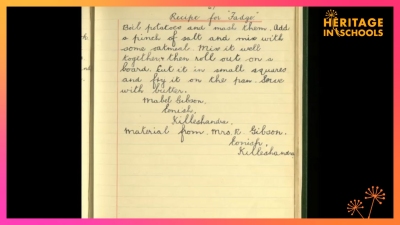
The Schools' Folklore Collection: John O'Neill
Learn now to access the Schools' Folklore Collections - includes activities where children are encouraged to ring grandparents with questions on what life was like when they were children.
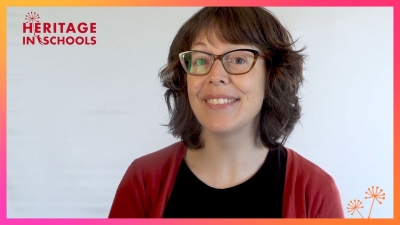
Learn to sing 'Na Blathanna': Aileen Lambert
A Heritage Council tutorial for primary school children teaching the words to a lovely Irish song 'Na Blathanna' and including a little folklore on each flower mentioned in the song.
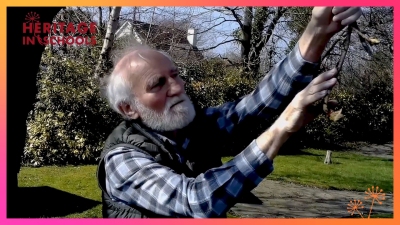
Noticing nature in your local park: Dr Paddy Madden
A Heritage Council tutorial for primary school children and their parents which will help them to identify some of the wildlife they might see on their springtime walks.
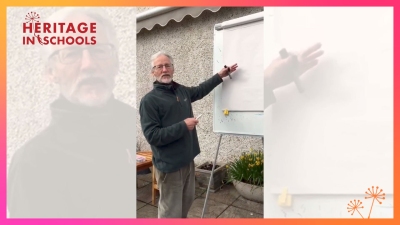
Wildlife Art for Beginners: Gordon D'Arcy
A Heritage Council tutorial for primary school children aged 5-7 yrs which will equip them with the skills to draw some of our common birds using simple shapes.
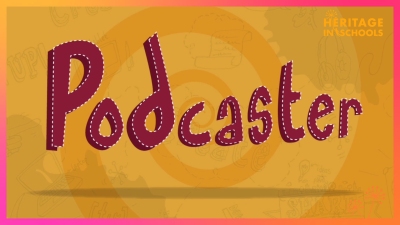
How to Podcast: Peter Baxter
A tutorial for primary school children on creating podcasts about their local heritage and using technology they have at home.
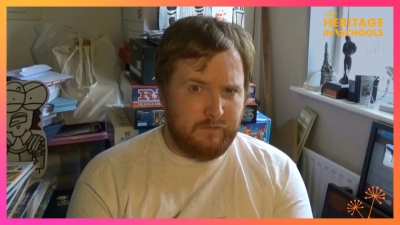
Online Time Machine: John D. Ruddy
A tutorial for primary school children, their teachers and parents on using online resources to explore the past using maps and illustration research techniques.
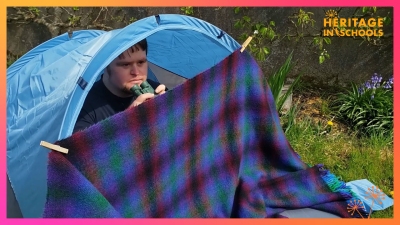
Backyard BioBitz: Fionn Crombie Angus
A tutorial for primary school children explaining what a BioBlitz is and what equipment and guides are useful for blitzing the garden at home.
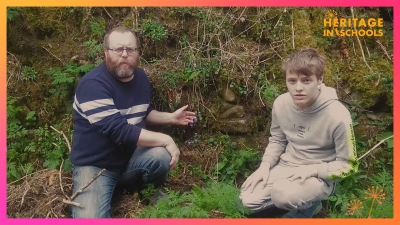
Wildlife Safari: Albert Nolan
A tutorial for primary school children about some of the wildflowers that can be found growing in gardens, woods and hedgerows. Learn how to recognize new species as well as useful tools to identify and record them.
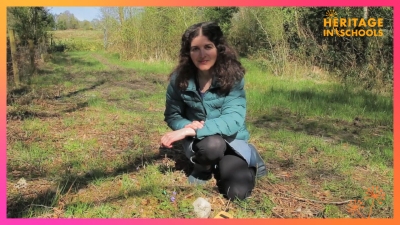
Music of the Plants Part 1 (Violet): Marina Levitina
A tutorial for primary school children - an introduction to the Violet in springtime in an Irish woodland including a lesson on how to draw the Violet.
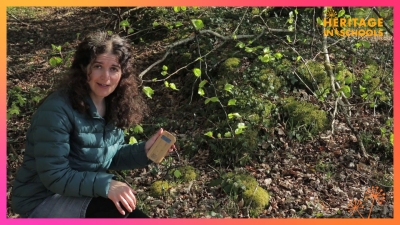
Music of the Plants Part 2 (Beech Tree): Marina Levitina
A tutorial for primary school children - an introduction to the Beech tree in springtime in an Irish woodland including a lesson on how to draw the Beech.
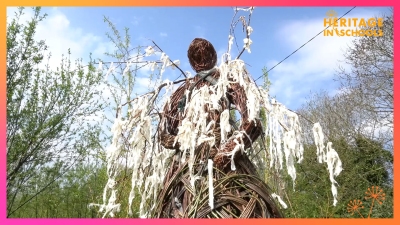
Let's go Fishing: Beth Murphy
An introduction to the ancient world of weaving and basket making including step-by-step instruction from Beth on how to weave a fish from willow or materials you might have at home.
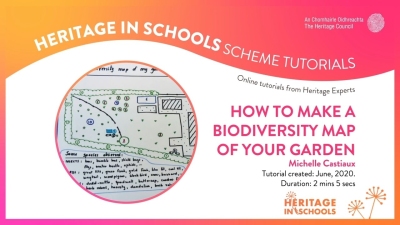
How to make a biodiversity map of your garden: Michele Castiaux
Michéle's step by step tutorial shows you how to draw a biodiversity/habitat map of your garden so that you can record where the different garden species are located. Your map can help you plan improvements to increase the biodiversity of your garden.
Suited to children from 3rd to 6th classes.
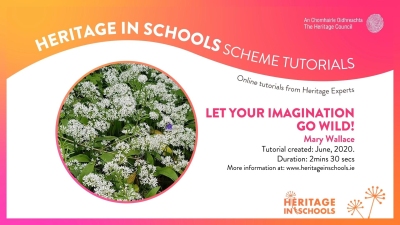
Let your imagination go wild!: Mary Wallace
An introduction to wild garlic as a native Irish herb that has been eaten in Ireland for thousands of year with a recipe for a delicious pesto.
Suited to children from 3rd to 6th class
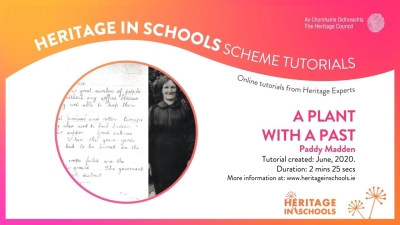
A plant with a past: Paddy Madden
This tutorial links a common wild plant, Charlock or Praiseach Bhuí to the Great Famine. Evidence from The Schools’ Folklore Collection 1937-39 states that hungry people during the Famine ate this plant, nettles and carrageen when the potato crop failed. Paddy briefly describes the plant, talks about the Famine, quotes from an interview with his grandfather in 1938 for the Schools’ Folklore Collection where he talks about the plant being eaten during the Famine.
Suited to children from 4th to 6th class.
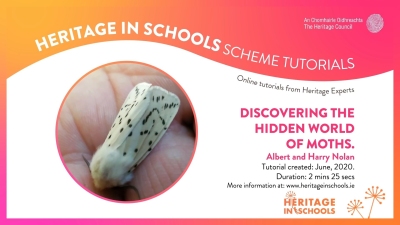
Discovering the hidden world of moths: Albert Nolan
This tutorial will help students to discover and understand the hidden world of moths and their importance in maintaining a healthy environment. Moths are much more than eaters of clothes and many are as colourful as butterflies. Learn how to make a simple light trap to attract moths as well as a moth attracting broth. Albert talks about gardening for moths and the importance of recording what moths you find. Suited to children and adults of all ages.
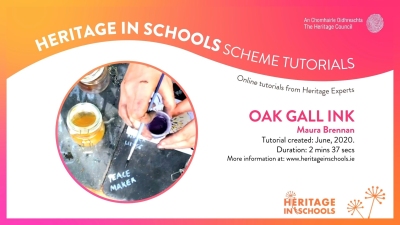
Oak gall ink: Maura Brennan
Early manuscripts such as the Book of Kells were created using Oak Gall Ink. In this tutorial we learn how Oak Gall Ink is made. Oak Gall wasps lay their eggs in Oak tree, The Oak tree responds by forming a gall around the larvae. The Oak galls are full of tannins and it is the tannins that are the essential ingredient to making Oak Gall Ink. We also share a simplified recipe which can be made from household vinegar. We also share ideas to make other plant based inks such as turmeric , elderberries and blackberries.
Suited to children from 2nd to 6th classes.
Materials: Vinegar, a Jar, Oak galls, plant materials to experiment with such as blackberries, elderberries, etc; paper, paintbrush/feather/ stick for mark making.
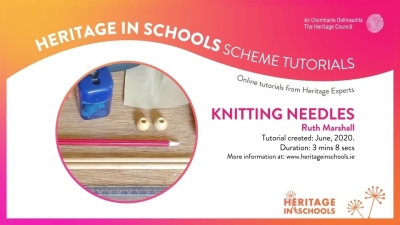
Knitting needles: Ruth Marshall
Knitting has always been an important skill required for making warm clothes in cold climates. But before you can even begin to knit, you need the basic tools - a set of knitting needles, and some yarn. Here, Ruth will show how you can make your own knitting pins - using sticks, a pencil sharpener and a little bit of sandpaper.
Suited to children of all ages.
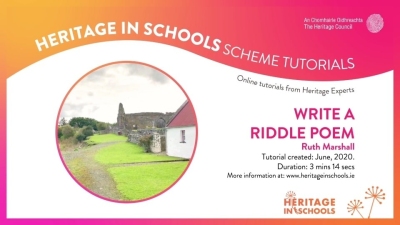
Write a riddle poem: Ruth Marshall
Listen to Ruth’s Riddle poem about a heritage site in Co. Clare. She tells us things about the place, but does not name it. We have to figure it out for ourselves. Ruth will guide you to explore a place in your own area, somewhere you know well. If you can, go there and have a good look around. What buildings, plants, animals do you see there? What is the atmosphere or mood? From your observations, write a poem of a few lines, telling us about the place - but do not tell us the name - leave us guessing!
Suited to children from 3rd to 6th classes.
Materials: Paper and pencil For more information: www.heritageinschools.ie
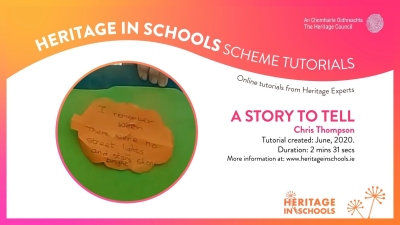
A story to tell: Chris Thompson
Children are encouraged to examine the heritage significance of their immediate environment through familiar local landscape features. The example of an old tree is used in this tutorial. The activity encourages children to consider questions about past, present and future through personification and the creation of an unusual pictorial poem at the same time. The activity can be applied to other local features, a road, an old building etc.
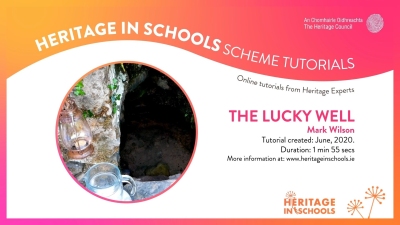
The lucky well: Mark Wilson
An introduction to the history of the traditional Irish farm well.
Suited to children and adults of all ages.
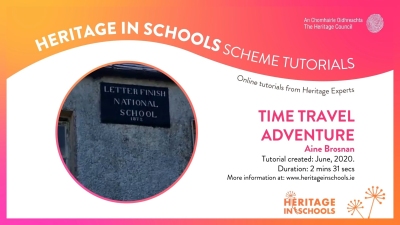
Time travel adventure: Áine Brosnan
This is an exercise for children to do to exercise their imagination and creativity . The idea is to get children thinking about a day in school in the past and then to draw a picture or write a little story.
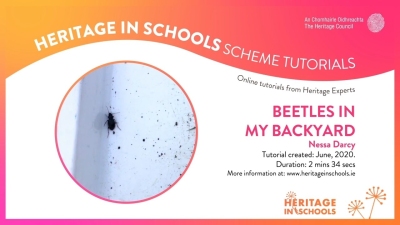
Beetles in my Backyard: Nessa Darcy
Learn how to create a pitfall trap in your garden to catch live ground beetles (carabids) and other invertebrates for a closer look.
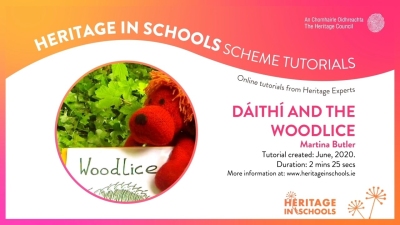
Dáithí and the Woodlice: Martina Butler
This tutorial shows children how to find nature (Woodlice) in their own back yard.
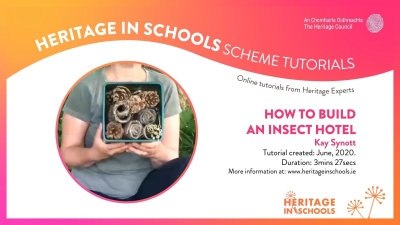
How to build an insect hotel: Kay Synott
Kay's tutorial, filmed in a woodland, demonstrates how to build an insect hotel with materials found at home and in a garden or woodland.
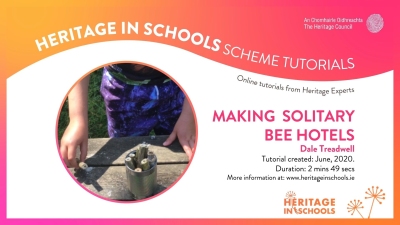
Solitary bee hotels: Dale Treadwell
Dale and Nathan show us how to construct a solitary bee hotel from materials you'll find at home.
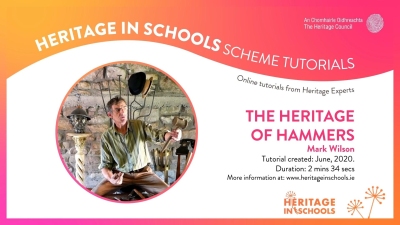
The heritage of hammers: Mark Wilson
Mark explains how finding the perfect hammer and learning to use it for its purpose has endless possibilities.
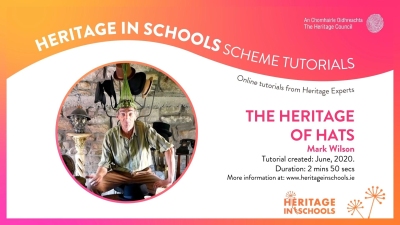
The heritage of hats: Mark Wilson
Mark explores through reminiscence the stories and styles of hats locally and globally and shares his extensive collection.
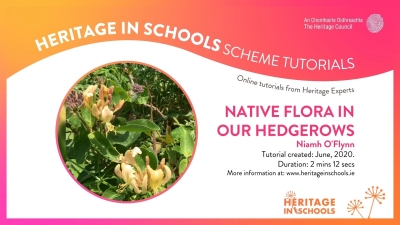
Native flora in our hedgerows: Niamh O'Flynn
Discover Hedgerows near you, what plants, flowers and trees can you find?
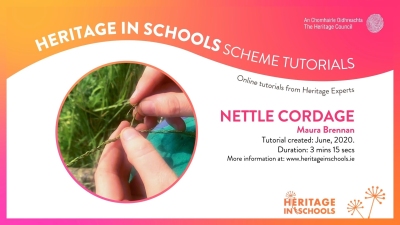
Nettle cordage: Maura Brennan
Discover the natural resources growing near your own doorstep! Learn about sustainable plant fibres as we learn how to process nettles to make cordage.
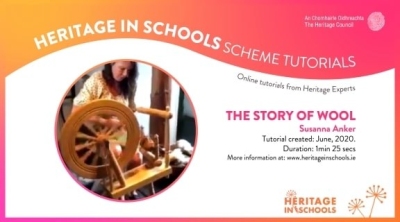
The story of wool: Susanna Anker
Susanna demonstrates the story of wool from wool carding to wool spinning on a Donegal Spinning wheel, to dyeing wool with plants and weaving fabric on a floor loom.
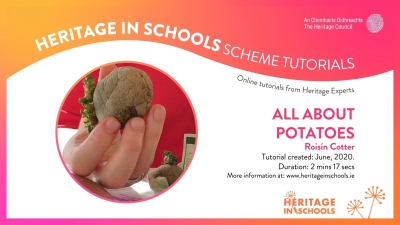
All about potatoes: Roisín Cotter
Growing potatoes are a huge part of our heritage. Knowing about their origins and how this one crop changed the whole history of our country is such an important part of our national story.
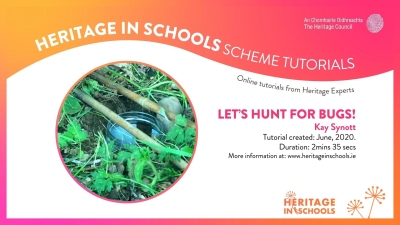
Let's hunt for bugs!: Kay Synott
Kay's tutorial, filmed in a garden, shows where to find different invertebrates, how to safely trap and identify them using a pitfall trap.
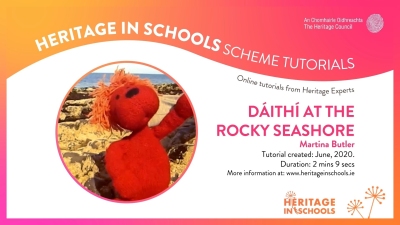
Dáithí at the Rocky Seashore: Martina Butler
This tutorial shows younger children a little about some of the typical species that can be found in rock pools at the rocky sea shore.
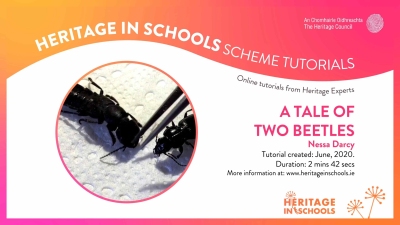
A tale of two beetles: Nessa Darcy
Legend has it that two different types of beetle once fought over a juicy slug, but all may not have been as it seemed.
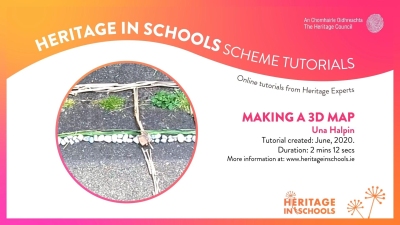
Making a 3D map of your walk: Úna Halpin
This tutorial encourages children to explore and record their local heritage by taking a walk locally and making a 3D map of what they have seen.
